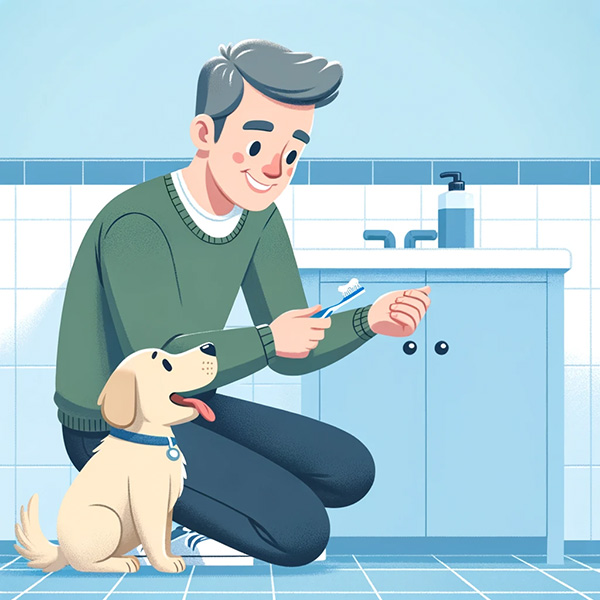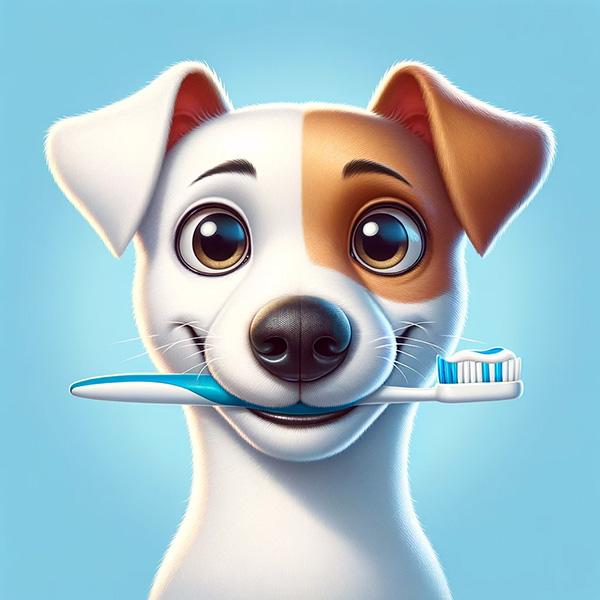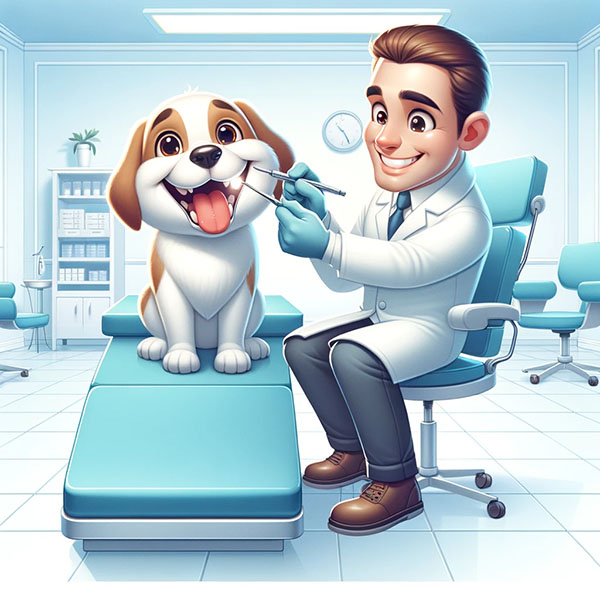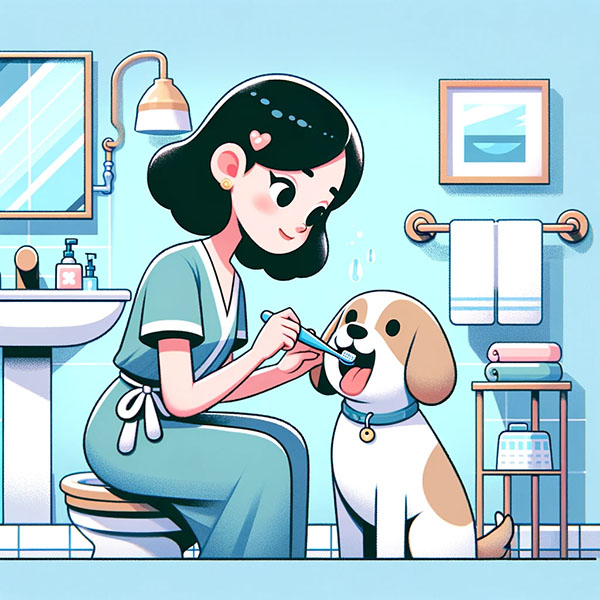Brushing your dog's teeth might not be the first thing you think of when it comes to pet care, but it's a crucial aspect of maintaining their overall health and well-being. Similar to humans, dogs are susceptible to dental issues such as plaque accumulation, gum disease, and tooth loss. If left unaddressed, these problems can escalate into more severe health issues. However, the world of canine dental care can be a maze of advice and products, leaving many pet owners wondering just how often they should be brushing their dog's teeth to keep these problems at bay.
In this post, we will demystify the process, offering clear, expert advice on maintaining your dog's dental health with regular brushing. Whether you're a seasoned dog owner or new to the pet parenting game, understanding the importance of dental care and establishing a routine that works for both you and your pooch is key.
The Benefits of Dog Tooth Brushing
The benefits of regular teeth brushing are comprehensive, touching on every aspect of your dog's health and happiness. It's a small investment of time that can lead to a lifetime of health benefits and stronger bonds between you and your furry friend. Here are some of the benefits
1. Prevention of Plaque and Tartar Buildup

Regularly brushing your dog's teeth helps mechanically disrupt and eliminate plaque, a soft, sticky film comprising bacteria, food particles, and saliva accumulating on the teeth. If not addressed, plaque can mineralize into tartar, a complex, yellowish deposit that firmly adheres to the tooth surface. Tartar buildup along the gumline can result in inflammation and gum infection, a condition known as gingivitis. By preventing the formation of plaque and tartar, regular brushing maintains the integrity of the teeth and gums, warding off the initial stages of periodontal disease.
2. Reduction of Gum Disease Risk

Gum disease, or periodontal disease, refers to an infection of the tissues surrounding and supporting the teeth, often resulting in tooth loss in pets. Regular brushing is essential to prevent the buildup of plaque and tartar, which are the primary contributors to gum disease. Early signs include bad breath, red and swollen gums, and bleeding. By keeping these symptoms at bay, regular dental care ensures healthier gums and a decreased risk of periodontal disease.
3. Prevention of Painful Dental Problems

Neglecting dental hygiene can lead to various painful dental issues for dogs, including cavities, broken teeth, and root abscesses. These conditions lead to discomfort and can impair a dog's ability to eat correctly. Regular teeth brushing can help detect these problems early or prevent them from developing, ensuring your dog remains pain-free and comfortable.
4. Avoidance of Systemic Health Issues

The bacteria found in plaque and tartar can enter the bloodstream through diseased gums, potentially traveling to major organs and causing infections or other serious health issues. Poor oral health has been associated with conditions such as heart disease, liver problems, and kidney infections. Maintaining a regular brushing routine, you help protect your dog from these potentially life-threatening systemic health issues.
5. Improved Breath

One of the most immediate benefits of regular teeth brushing is fresher breath. Foul breath in dogs is frequently attributed to the accumulation of bacteria and food debris in the mouth. Removing these elements keeps your dog's mouth fresh, making those close moments more enjoyable for both of you.
6. Cost Savings on Veterinary Bills

Dental procedures for dogs can be quite expensive, especially when issues have progressed to the point of needing professional cleaning, extractions, or other treatments. By investing time in regular teeth brushing, you can prevent many of these issues from arising, significantly reducing the need for costly dental work and the associated risks of anesthesia.
7. Enhanced Quality of Life and Longevity

Good oral health is a key component of a dog's overall health and quality of life. Dental pain can lead to difficulties in eating and may result in nutritional deficiencies or weight loss. By ensuring that your dog's teeth and gums are healthy, you're also supporting their ability to enjoy a full and balanced diet, contributing to their overall health and potentially extending their lifespan.
8. Strengthening the Bond Between Pet and Owner

Brushing your dog's teeth does more than just keep dental disease at bay; it also provides a regular, intimate interaction between you and your pet. This routine can help strengthen your bond as your dog learns to trust and feel comfortable with you during these close moments. It presents an opportunity to demonstrate care and affection, strengthening the bond between you and your pet.
What Is The Recommended Frequency for Brushing Dog Teeth
Veterinary professionals widely recommend that dog owners brush their dogs' teeth daily, which is the ideal frequency for maintaining optimal oral health in dogs. This daily care routine is crucial because plaque—a mixture of bacteria, saliva, and food particles—can begin to form on the teeth within hours after eating. If plaque is not removed within 24 to 36 hours, it can harden into tartar, a calcified deposit that strongly adheres to the teeth and is much more difficult to remove than plaque.
While the recommendation is to brush your dog's teeth daily, veterinarians understand that this may not be feasible for all pet owners due to various constraints such as time or a dog's tolerance for brushing. In such cases, it's advised to brush as frequently as possible and to consider supplemental dental care options, such as dental diets, dental chews, and toys that can help reduce plaque and tartar buildup.
When To Start Brushing A Dog's Teeth
Introducing dental care routines for dogs should begin as early as possible, ideally when they are puppies. At around 8 to 12 weeks of age, puppies should gradually acclimate to having their mouths and teeth touched and inspected. This early introduction helps them become comfortable with the sensation of teeth brushing and dental examinations, making it easier to maintain their dental health throughout their lives.
However, the actual brushing of teeth with pet toothpaste should commence once all the puppy's adult teeth have come in, typically by 6 months. This is when establishing a regular teeth brushing routine becomes crucial to prevent the onset of dental issues. Unlike human toothpaste, dog toothpaste does not have to be spit out. You can use either a dog toothbrush or finger brush to have their teeth brushed but finger brushes may not clean dogs teeth as well as a toothbrush. Early and consistent dental care can prevent plaque and tartar build-up, reducing the risk of periodontal disease.
If you have an older dog who hasn't been introduced to dental cleaning can learn to tolerate and even accept tooth brushing. While it may take awhile for a dog to get used to the tooth brushing process, with the right approach and consistent training, it's possible to introduce oral hygiene routines to your dog, regardless of age.
A veterinarian's recommendation for professional teeth cleaning can vary depending on the dog's breed, size, and individual dental health. Generally, most dogs should have their first professional dental cleaning by the time they are 1 to 2 years old. Smaller breeds, more prone to dental issues, may require earlier and more frequent dental care. Your veterinarian can offer tailored guidance after assessing your dog's teeth and overall health.
